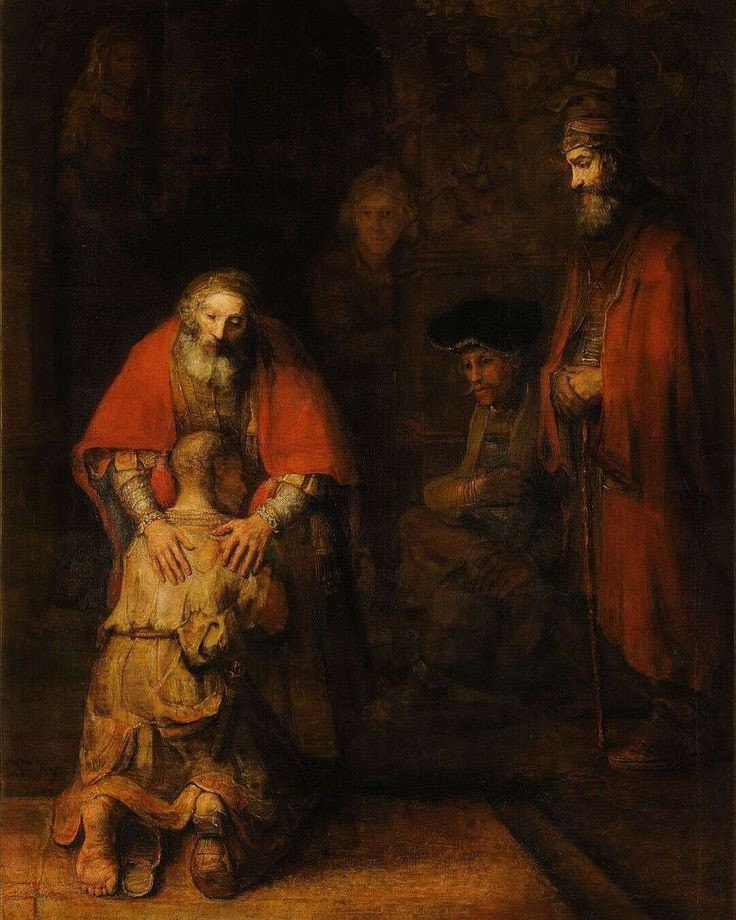
Lk.15:1-3,11-32
One of the major themes that runs through the season of Lent is forgiveness. The gospel passage of the day invites us to reflect on the unconditional forgiveness of Abba Father through the parable of the prodigal son. Even though the entire story revolves around the figure of the youngest son who squanders his father’s wealth, the real hero of the story is the father, who squanders his love upon his sons and entire households.
One of the questions that can linger in our mind as we reflect on this parable is Why did father give share to his youngest son and allow him to leave? The eldest son will inherit a double share of the ancestral property as per Jewish tradition. Therefore, the youngest son will inherit only one third of the ancestral property. He was raised by his father, who knew the fact that he would not be able to handle his wealth responsibly and that it was possible to mishandle it. Yet, he respected the freedom of his youngest son, who fell under the misconception that the world was more fascinating than his father’s house. The property would be divided only after the father’s death, as per Jewish custom. Demanding ancestral property when the father was still alive was regarded as a serious offence and treating him equally as dead. This is the power of misconception created by sin, which would blind us to choose the pleasures of the world rather than the father’s tender caring and compassionate love. The father respected the freedom and rights of his son. He never forced him to be with him or deprived him of his share. This is the nature of unconditional love. The influence of sin is so attractive and fascinating that it will tempt us to slip away from our father’s love, thinking that we will find better love outside, to the extent of considering our father equally dead.
However, we cannot condemn the youngest son because he stood closer to the father’s heart than his elder brother. He knew his father would respect his freedom, grant his desire, and be aware of his father’s compassionate and forgiving heart. He messed up his life and ended up in a pigsty, experiencing severe famine, hunger, and humiliation. These impacts of a sinful life were hard on him. The deprivation of all his grace and gifts that he experienced in the pigsty helped him to realise that he had lost everything except his father’s love. He knew that he was not at all worthy of being accepted by his father, yet he did not want to end his life in disappointment. He wanted to get back to his father’s love, not as his son but as one of his heired servants. This is the true sign of conversion—feeling unworthy to be loved and accepted by the father, yet desiring to be in his bosom. The preparation of confession that he did reveals the depth of his contrition. He realised the greatness and worth of his father’s love over the pleasures of sin. He was sure that his father’s love would never fail. Father rushes up to him and embraces him to the core of his being. He did not allow him to complete his confession of his failures and mercy plea, it was not needed for the father. He was lost now, he has found him and once again he is alive in his love. He accepts him as his beloved son without any reduction of his merit as his son. His new ring, robe, and sandals reveal this unconditional love, forgiveness, and acceptance from the Father. The celebration reveals the joy of heaven over a repented sinner.
The tragic character of the story is the eldest son, who though he always stayed with the father, could not experience the compassionate heart of the father. He was far from his father’s heart. He was unable to imbibe any of the Father’s characteristics. Though he was the eldest son, he lived as though he was a slave. He remained unforgiving and grumpy about his father’s love. He could not accept his younger brother. Even then, he was assured of his father’s wealth. He remained an accuser of his younger brother. He represents the pharisees and scribes who were not ready to accept the tax collectors and prostitutes remained with their hearts, which were hardened by their pride.
In our journey through life too, we may pass through all these three characters. Like the prodigal son, we too might have squandered our father’s love. Like the eldest, though he might have lived in the father’s house, he failed to recognise his love and mercy and instead remained as an accuser. Ultimately, all of us are called to become prodigal fathers who love both their sons unconditionally and extend unconditional forgiveness in spite of their failures.
We experience our heavenly father’s unconditional love and acceptance. The father did not go in search of his son because he respected his son’s freedom, but when he returned, he embraced him wholeheartedly. He did not want to hear all his mercy pleas, but was busy restoring all that he had lost due to his sinful life. Our Heavenly Father awaits us in the Sacrament of reconciliation. When we take one step towards the heavenly Father, He runs and embraces us at his mercy. Whatever our failures, he never minds. His intention is to shower his mercy and compassion on us and accept us back with the same love as heirs of our father’s house, granting the grace of forgiveness, mercy, and renewed life. God’s unconditional love and mercy are waiting for us in the sacrament of reconciliation. May this season of Lent encourage us to come to the sacrament with this confidence.